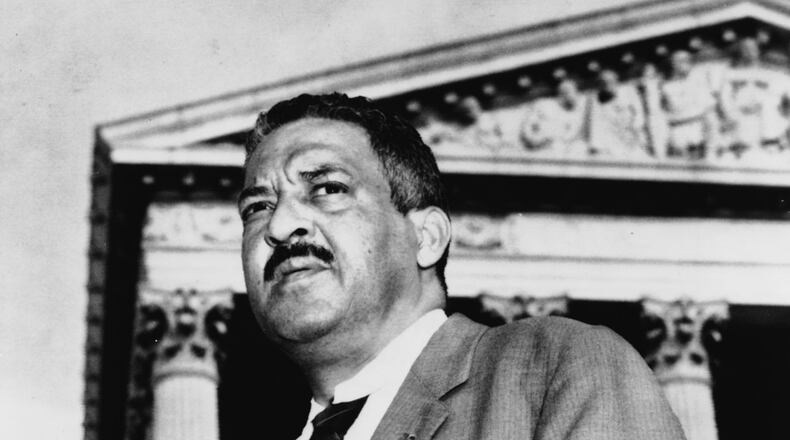According to press notes, the film traces Marshall’s journey from his birth in Baltimore, Maryland, in 1908 to his formative years at Historically Black Colleges and Universities (HBCUs) Lincoln University and Howard University School of Law to his groundbreaking career as a lawyer championing civil rights and dismantling segregation.
Credit: AP
Credit: AP
Marshall won 29 of the 32 cases he argued before the U.S. Supreme Court, including the landmark Brown v. Board of Education in 1954, invalidating the “separate but equal doctrine” and ending racial segregation in public schools. But the decision was met with “massive resistance” across the South and continued to be fought in the courts for decades.
“Thurgood is probably not taught as much as he should be in schools,” said author, historical and journalist Wil Haygood, a Columbus native who serves as the Boadway Distinguished Scholar-in-Residence for the Department of Media, Journalism and Film at Miami University. “This is a nation that has hidden from aspects of its history. This is a nation that has perpetrators who try to rewrite or twist history but the truth is the truth. The truth rather needs no defense — because it’s the truth — but we have to fight to get it out because the truth exists. Thurgood was here, he looked the country in the eye, he altered the nation’s laws, and he went to the highest court in the land. He made a difference."
Haygood, the 2022 recipient of the Dayton Literary Peace Prize’s Ambassador Richard C. Holbrooke Distinguished Achievement Award, is among the scholars offering commentary in the documentary. Scholars include: Sherrilyn Ifill, former president and director-counsel for the NAACP Legal Defense and Educational Fund, Inc.(LDF); Gilbert King, author of “Devil in the Grove: Thurgood Marshall, the Groveland Boys, and the Dawn of a New America,” which won the 2013 Pulitzer Prize for general nonfiction; and Cecilia Marshall, Thurgood’s granddaughter who serves on the board of directors for the NAACP Legal Defense Fund.
As the author of “Showdown: Thurgood Marshall and the Supreme Court Nomination that Changed America,” Haygood was pleased to offer reflections about the visionary lawyer and civil rights leader.
“Thurgood paved the way for little Wil Haygood, born in 1954, to become the writer and historian that he is,” Haygood said. “I owe Thurgood Marshall a huge debt, and the only way I see myself able to pay it is to keep writing and reporting on the stories that matter to me and the stories that I think America needs to know about. I’m very moved by the wisdom, knowledge and foresight of all the scholars that appear in the film who talk about Thurgood Marshall at certain stages in his life.”
Looking ahead, Haygood anticipates the February 2026 release of his new book, “The War Within a War: The Black Struggle in Vietnam and at Home.” But in the meantime he hopes the PBS documentary, bolstered by current events, will bring greater resonance to Marshall’s legacy and the ongoing work being done to ensure representation matters.
“The film is extraordinarily timely,” Haygood said. “There are attacks almost daily on Black Americans in this country right now. If Thurgood were alive, he would be in and out of courtrooms daily. There are lawyers who have taken up his mantle and they are fighting back in courtrooms every day. The attacks on Diversity, Equity and Inclusion (DEI) have been both tragic and shameful. I’m certainly not the first person to say it, but diversity makes this country stronger. And we really have to look in the mirror and figure out what kind of country we want to be.”
HOW TO WATCH
What: “Becoming Thurgood: America’s Social Architect”
When: 10 p.m. Tuesday, Sept. 9 on PBS. The documentary will also be available on PBS.org and the PBS app.
Credit: Charles Tasnadi
Credit: Charles Tasnadi
About the Author




